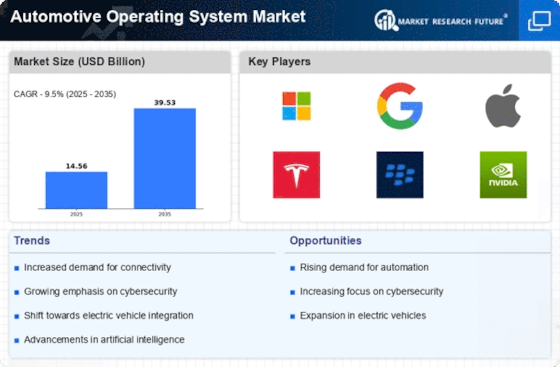Market Analysis
In-depth Analysis of Automotive Operating System Market Industry Landscape
The market dynamics of automotive operating systems are undergoing a transformative shift as vehicles become increasingly connected, automated, and reliant on advanced software solutions. One key dynamic is the growing demand for sophisticated operating systems that can seamlessly integrate with the complex network of sensors, processors, and communication modules in modern vehicles. The rise of electric vehicles (EVs), autonomous driving features, and connected car technologies amplifies the need for robust automotive operating systems that can manage and optimize these intricate systems. This dynamic is underscored by the evolving nature of the automotive industry, where software-driven innovations play a pivotal role in defining the driving experience.
Technological advancements are at the forefront of shaping the market dynamics of automotive operating systems. The integration of Artificial Intelligence (AI), machine learning, and advanced driver-assistance systems (ADAS) requires operating systems capable of handling real-time data processing, decision-making, and seamless communication between various vehicle components. The dynamic evolution of these technologies prompts continuous updates and improvements in automotive operating systems, fostering an environment of innovation and competition among software providers.
The consumer demand for enhanced connectivity and infotainment features is another significant dynamic influencing the automotive operating system market. Modern drivers expect seamless integration with their smartphones, access to navigation, entertainment, and connectivity services. Operating systems that offer user-friendly interfaces, voice recognition, and over-the-air (OTA) updates cater to these consumer expectations. This dynamic reflects the shift toward creating an integrated and personalized in-car experience, contributing to the development of more intuitive and feature-rich automotive operating systems.
Interoperability and standardization are essential dynamics within the automotive operating system market. As vehicles incorporate diverse hardware and software components from various manufacturers, the need for standardized operating systems becomes crucial. This dynamic ensures that different vehicle models and brands can seamlessly communicate and share data, fostering compatibility and a more open ecosystem. Standardization also facilitates collaboration within the automotive industry, promoting the development of common platforms and reducing fragmentation in the operating system landscape.
Security considerations constitute a critical dynamic within the market for automotive operating systems. With the increasing connectivity of vehicles, the potential cybersecurity threats to in-car systems rise significantly. Operating systems must be equipped with robust security features to protect against unauthorized access, data breaches, and malicious attacks. The dynamic nature of cybersecurity challenges necessitates continuous updates and improvements in the security protocols embedded within automotive operating systems.
Cost dynamics play a role in shaping the market for automotive operating systems, influencing both manufacturers and consumers. While automakers seek cost-effective solutions for integrating advanced operating systems into their vehicles, consumers consider the overall cost of ownership and the perceived value of in-car technologies. The dynamic balance between providing cutting-edge features and maintaining affordability influences the strategies of operating system providers and their adoption within the automotive industry.
Global economic factors impact the market dynamics of automotive operating systems, influencing investment in research and development, consumer purchasing power, and the overall demand for advanced in-car technologies. Economic downturns may lead to a slowdown in new vehicle purchases and the adoption of premium operating systems. Conversely, economic growth and the increasing focus on technology-driven solutions in the automotive sector contribute to sustained investments in advanced operating systems.
Competition within the market is a driving dynamic, fostering innovation and differentiation among operating system providers. As major tech companies and traditional automotive players vie for dominance, the market witnesses a continuous push for new features, improved performance, and strategic partnerships. This dynamic environment compels operating system providers to stay at the forefront of technological advancements, ensuring their solutions align with the evolving needs of automakers and consumers in an increasingly software-driven automotive landscape.
The market dynamics of automotive operating systems are shaped by the relentless march of technology, consumer expectations, interoperability requirements, security considerations, cost dynamics, global economic factors, and competitive pressures. As vehicles transition into smart, connected, and autonomous entities, the role of operating systems becomes increasingly pivotal. The dynamic nature of these factors ensures that automotive operating systems will continue to evolve, adapt, and play a central role in defining the future of the automotive industry.

















Leave a Comment